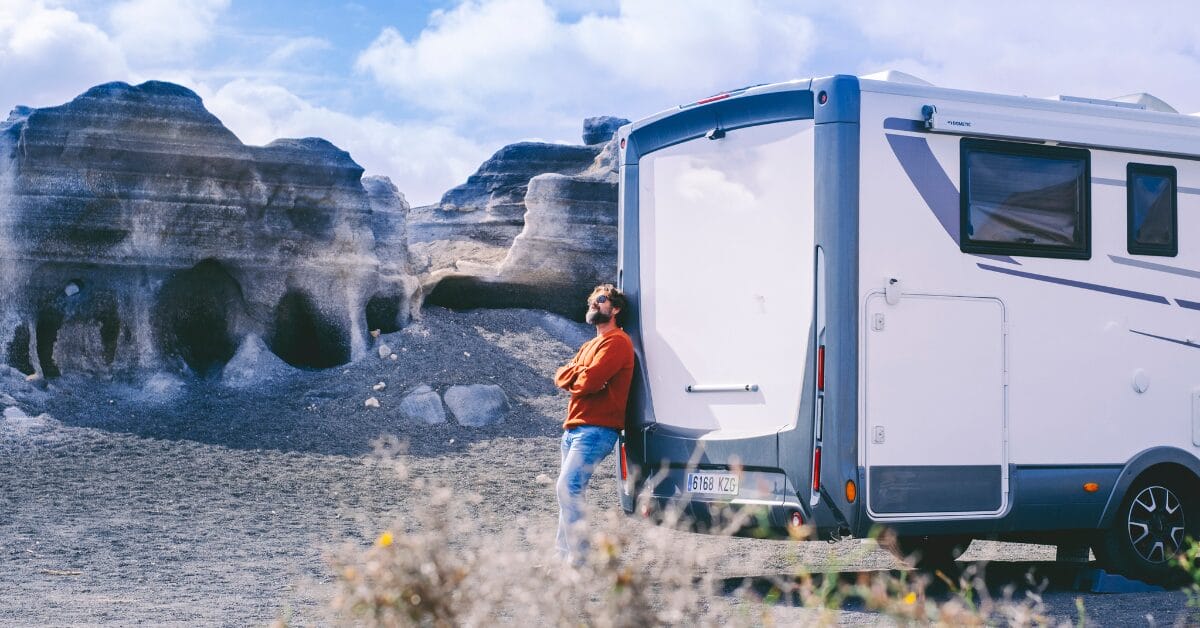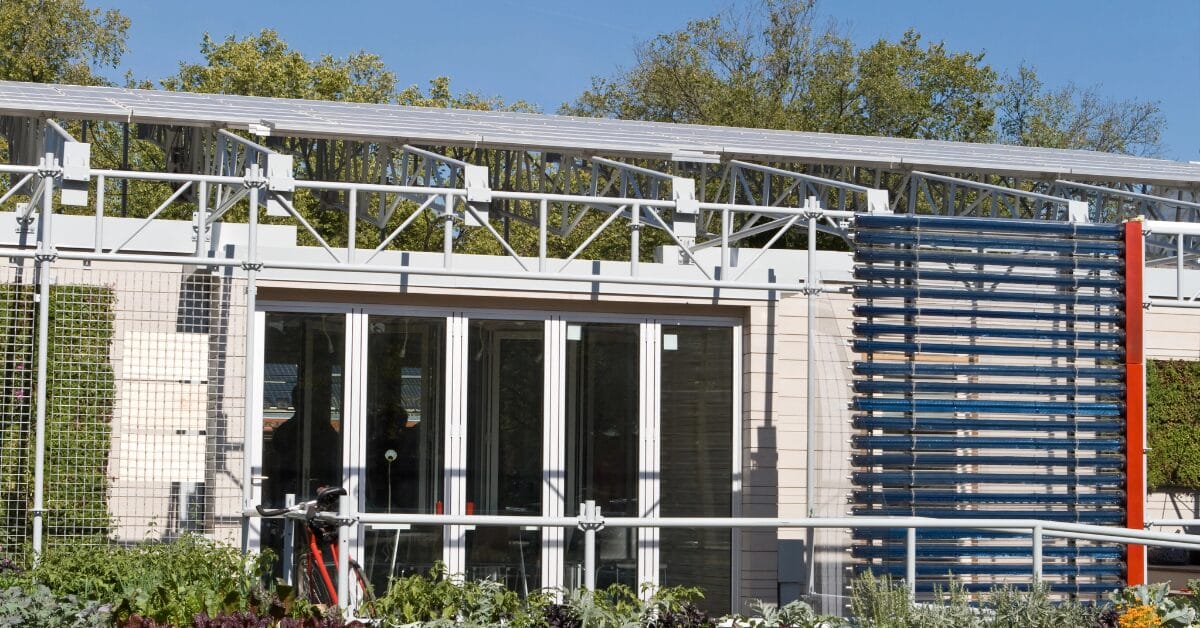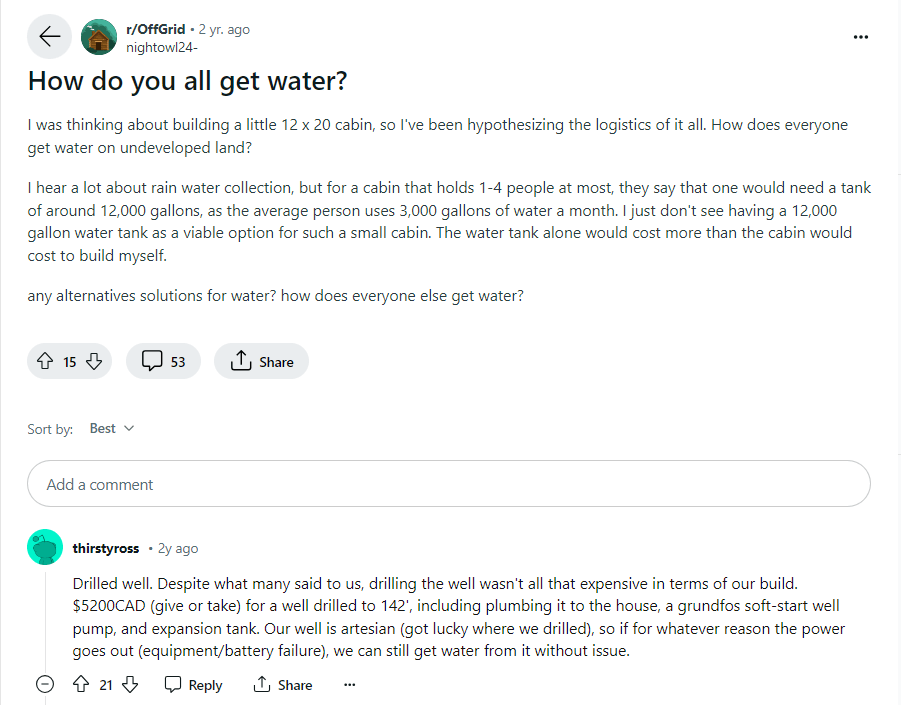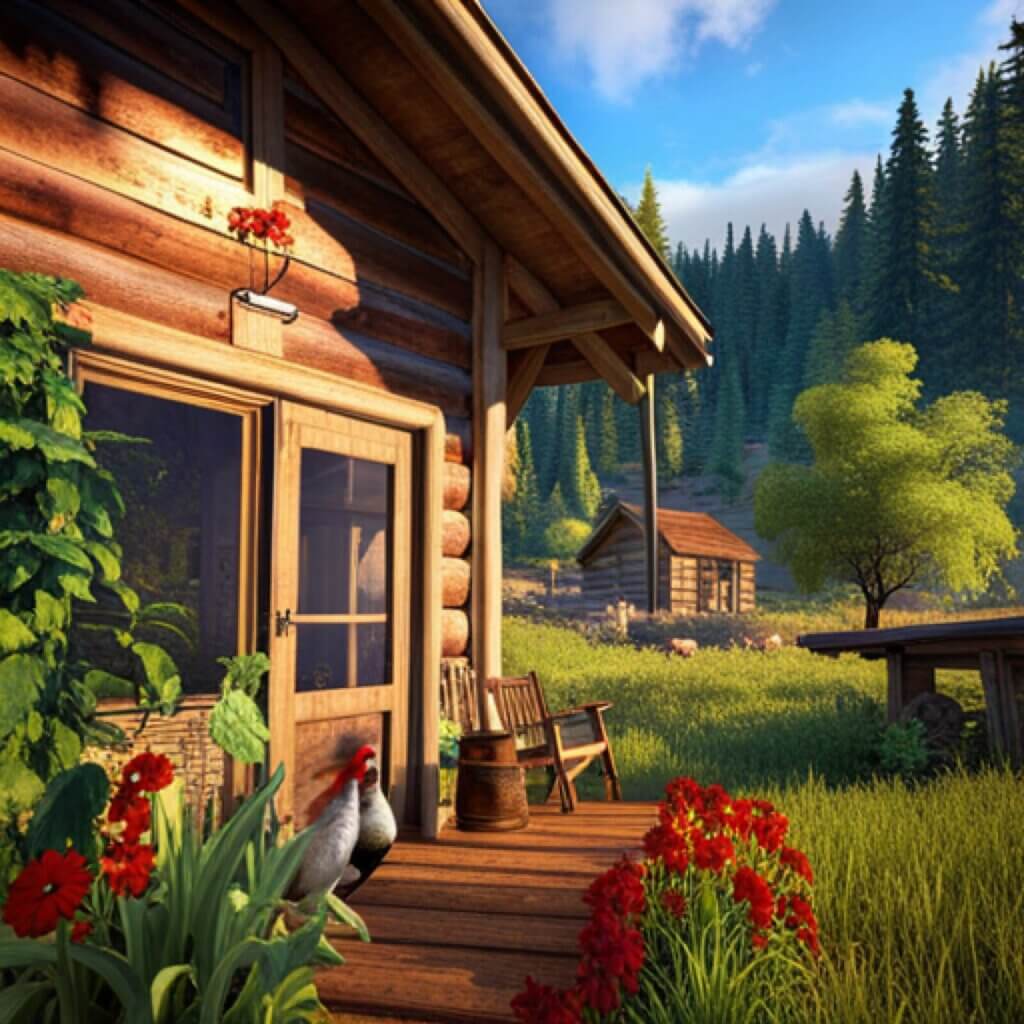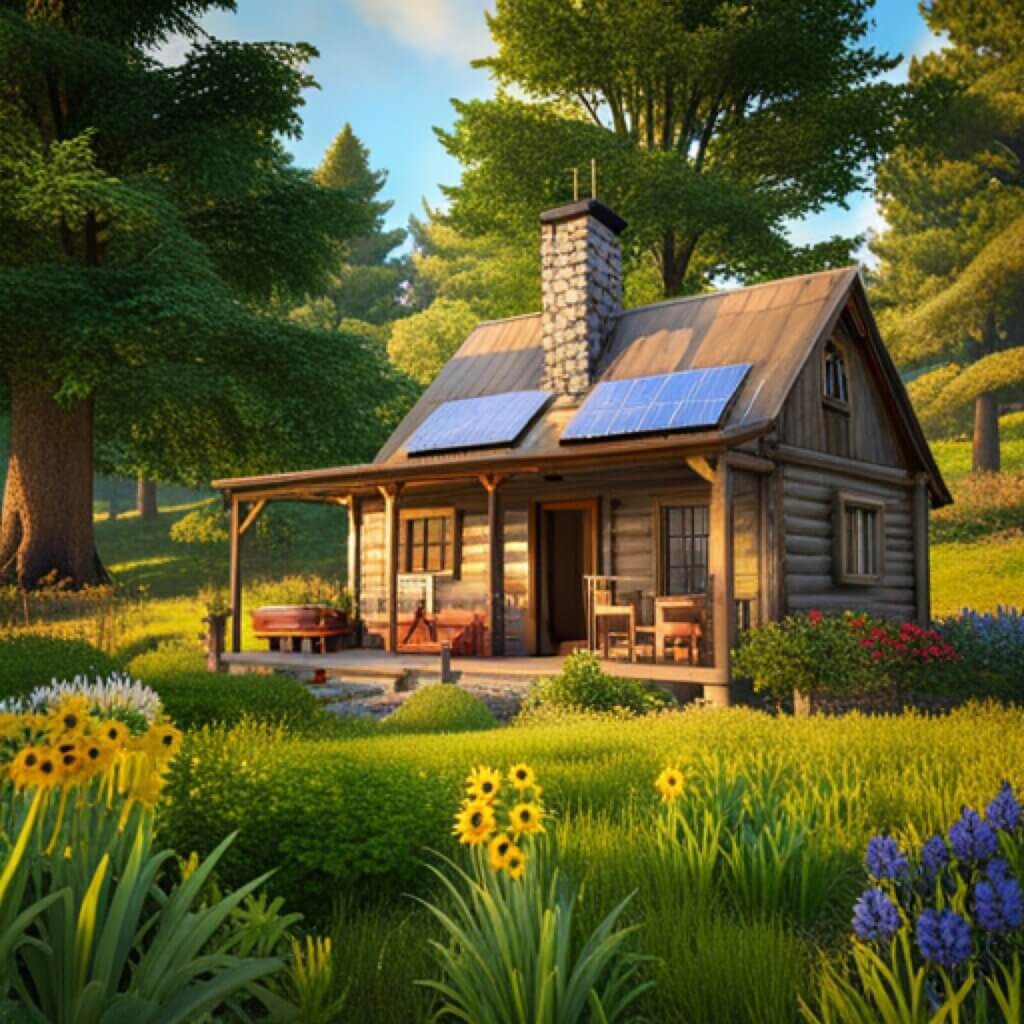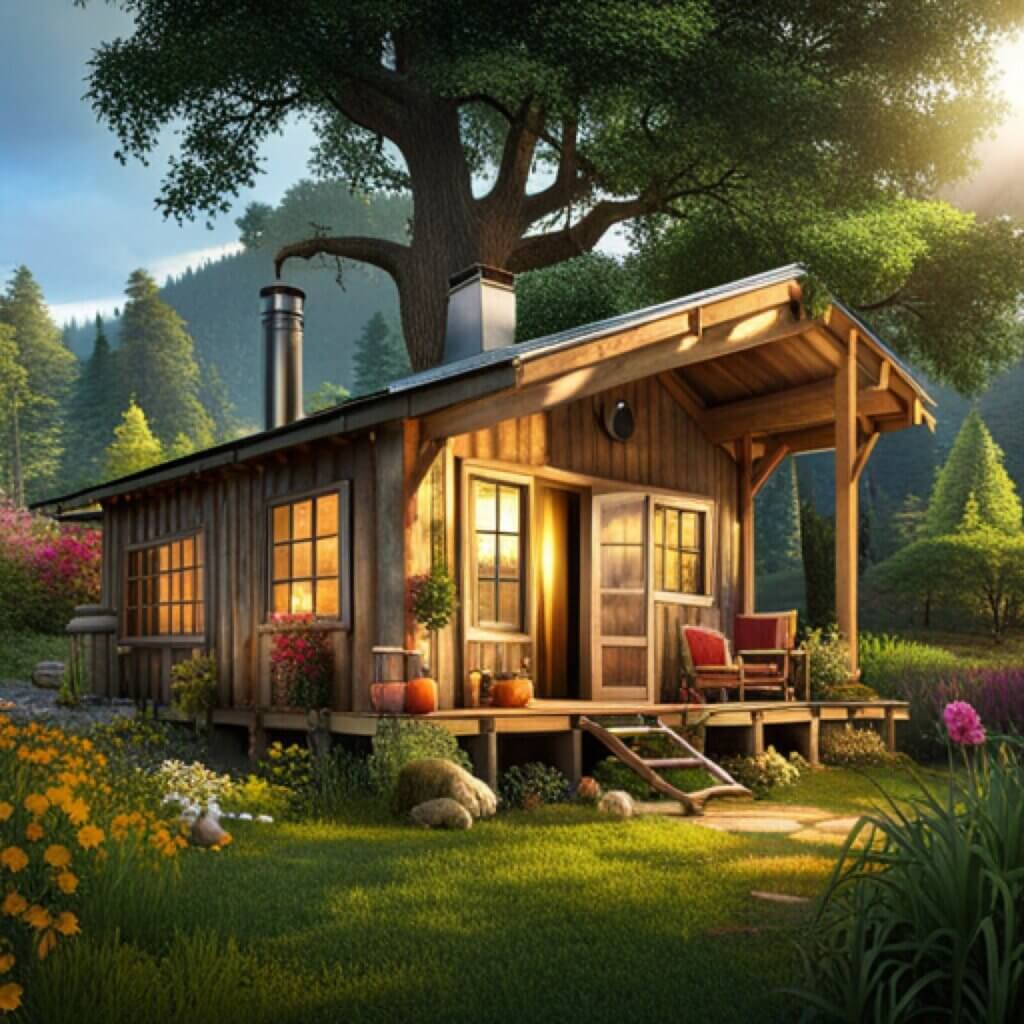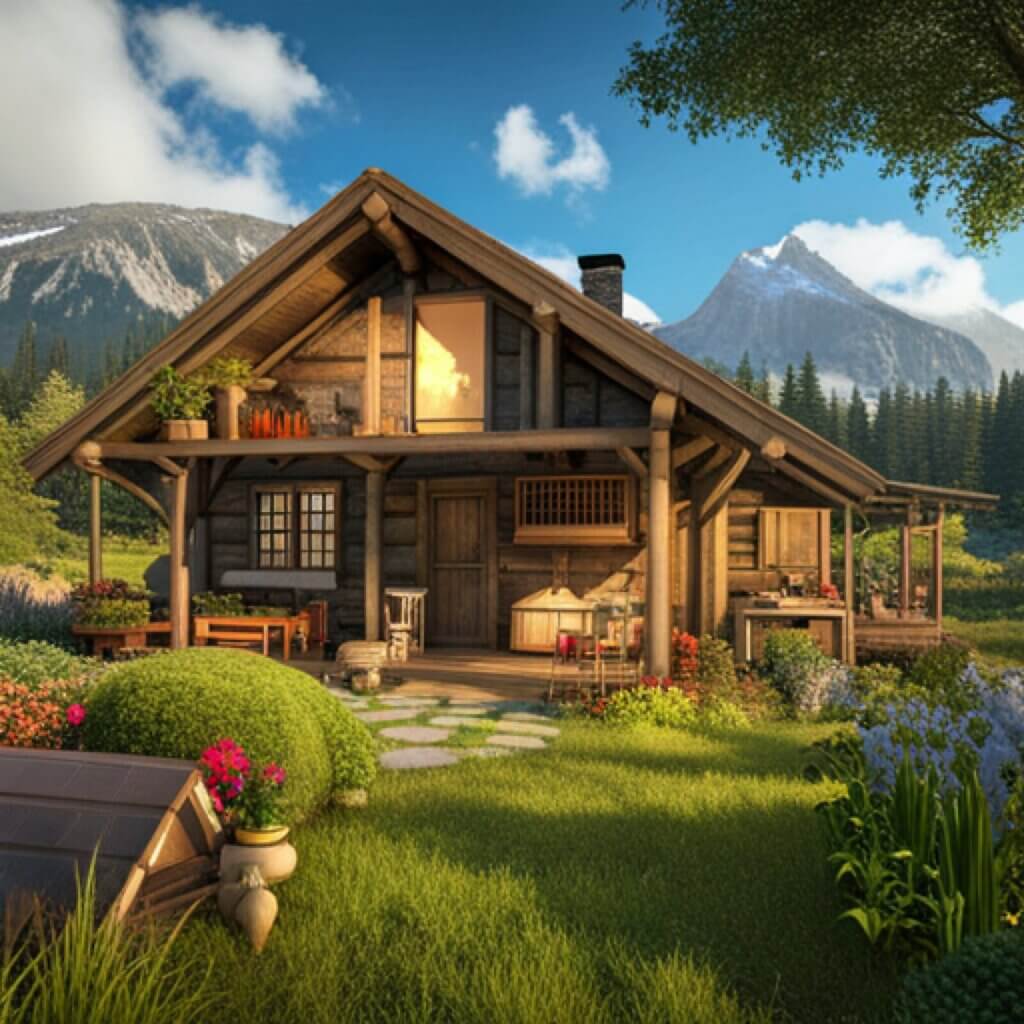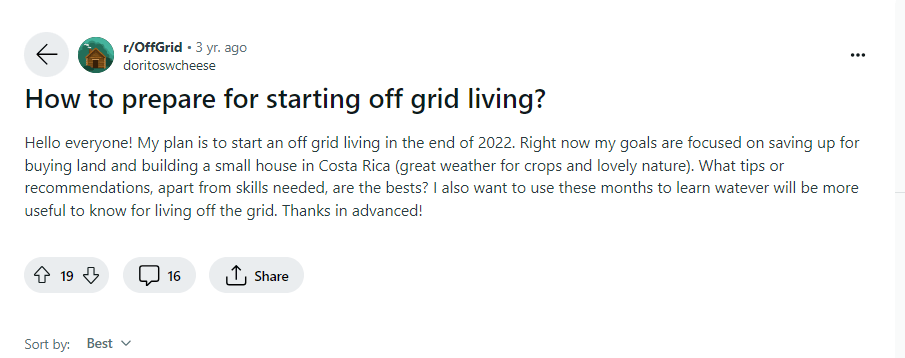Off-grid living is the treasure map for independence seekers. For those of us with a thirst for self-reliance, off-grid living is the ultimate adventure. And for souls seeking solace, the off-grid path promises a sanctuary away from the clamor of the crowd. It’s a chance to breathe deep, unclutter your life, and rediscover the quietude that modernity often drowns out. It’s not just a place; it’s a tranquil state of mind.
Imagine a life disconnected from the electric grid, water supply, and grocery stores, where you become the master of your domain, living in harmony with nature.
In this in-depth guide, we will help you discover how to live off the grid with no money and provide you with the knowledge and strategies necessary to make it happen without significant financial resources.
Understanding Off-Grid Fundamentals
What does living off the grid mean? At its core, living off the grid means being self-sufficient and independent of public utilities and services. This includes generating your own electricity, sourcing your own water, and managing your waste without relying on municipal systems.
Going off the grid offers several advantages, such as increased independence, self-reliance, and a greater sense of freedom. It can lead to a more stress-free life, as you use your own resources without worrying about utility bills, and being in nature promotes peace.
Venturing into the world of off-grid living can often paint a picture of a rugged, lone existence far from civilization. But let’s clear the air: it’s a modern myth that going off-grid cuts you off from the rest of the world. In fact, many who choose this path are as connected as ever, if not more creatively so.
Think of the off-grid entrepreneur, whose forest-encircled cabin doubles as a global headquarters. Online stores, digital art, consulting – the trees don’t limit these thriving businesses. The world is their market, with customers as likely to be from a bustling city as they are from the quiet town down the winding mountain road.
Living off-grid in today’s world is about crafting a harmonious blend of self-reliance and connectivity. It isn’t a step backward but a stride towards a lifestyle where freedom, sustainability, and global connectivity coexist. It’s an invitation to travel down a path less trodden, without ever losing touch with the pulse of the planet.
Types of Off-Grid Living
Now, when considering living off the grid, there are various approaches that individuals can take to achieve a self-sufficient lifestyle. Each type of off-grid living offers unique challenges and rewards, catering to different preferences and goals.
It’s vital to explore the different options available and choose the one that aligns best with your values and vision for off-grid living. Assume that by understanding the characteristics of each type of off-grid living, you can make an informed decision about which approach suits you best.
| Homesteading: A Self-Sufficient Approach | Nomadic Living: Embracing Mobility and Minimalism |
| Eco-Villages: A Community-Based Alternative | Wild foraging: Subsisting from the Land |
Homesteading: A Self-Sufficient Approach
There’s a timeless appeal to homesteading, where individuals embrace a self-sufficient lifestyle by growing their own food, raising animals, and building sustainable homes. Homesteaders prioritize skills like gardening, woodworking, and animal husbandry to create a thriving off-grid homestead.
They often rely on renewable energy sources, such as solar panels and wind turbines, to power their homes. By connecting with the land and living in harmony with nature, homesteaders experience a deep sense of fulfillment and independence.
Homesteading requires dedication, hard work, and a willingness to learn new skills. From planting crops and preserving food to maintaining off-grid systems, homesteaders must be versatile and resourceful.
Nomadic Living: Embracing Mobility and Minimalism
Embracing a nomadic lifestyle offers the freedom to travel and explore while living off the grid. Nomads prioritize mobility and minimalism, choosing to live in portable dwellings like trailers, yurts, or vans.
By simplifying their possessions and connecting with nature, nomads experience a sense of liberation and adventure. They often rely on renewable energy sources and off-grid systems to maintain their mobile lifestyle, moving from place to place as they seek new experiences and connections.
Nomadic living requires a mindset of flexibility, adaptability, and a willingness to embrace change. Nomads must be comfortable with uncertainty and able to navigate diverse environments and challenges.
Eco-Villages: A Community-Based Alternative
With a focus on collaboration, sustainability, and shared resources, eco-villages offer a unique approach to off-grid living. Residents in eco-villages come together to create intentional communities that prioritize environmental stewardship, social connection, and mutual support.
By sharing responsibilities, resources, and decision-making, eco-villagers create a harmonious and resilient living environment that reflects their values and ideals. Eco-villages often incorporate eco-friendly practices, such as renewable energy systems, permaculture gardens, and sustainable waste management solutions, to minimize their environmental impact and promote a sense of community well-being.
With a strong emphasis on inclusivity, diversity, and participatory decision-making, eco-villages provide a supportive and nurturing environment for individuals seeking a more communal off-grid lifestyle.
Wild foraging: Subsisting from the Land
For those seeking a direct connection to nature and a minimal impact lifestyle, wild foraging offers a unique off-grid living approach.
By subsisting from the land, foragers embrace traditional skills and knowledge to gather wild foods, medicinal plants, and natural resources. Through sustainable harvesting practices and a deep respect for the environment, foragers create a harmonious relationship with the land and its abundant offerings.
Wild foraging encourages individuals to slow down, observe their surroundings, and cultivate a deep appreciation for the natural world. By embracing wild foraging as an off-grid lifestyle choice, individuals can nourish their bodies, minds, and spirits while living in harmony with the earth.
Factors to Consider Before Going Off-Grid
Venturing into an off-grid lifestyle is a transformative decision, and weighing every aspect is essential. A thorough evaluation of your situation, available resources, and potential costs will prepare you for a smooth transition to a self-sufficient life.
Taking the time to assess your options, understand the costs involved, and plan accordingly will set you up for a smoother transition and a more sustainable off-grid lifestyle.
Let’s talk about some of the factors you must consider before making a decision.
Assess Your Options and Resources
When considering going off-grid, it’s crucial to evaluate your current situation and the resources available to you. This assessment will help you determine the feasibility of your off-grid plans and identify areas where you may need to make adjustments or acquire additional resources.
Understanding the Costs Involved
While the goal of living off-grid with no money may seem appealing, it’s essential to have a clear understanding of the costs involved. Even if you aim to minimize expenses, there will still be some initial investments and ongoing costs to consider.
Setting up an off-grid home requires an upfront investment in essential systems and infrastructure. This may include costs for solar panels, batteries, water filtration systems, composting toilets, and building materials for your shelter. Research the prices of these items and create a realistic budget for your initial setup.
Off-grid systems and equipment require regular maintenance and eventual replacement. Factor in the costs of maintaining and replacing components such as solar panels, batteries, and water filters over time. While these costs may be spread out, it’s important to plan for them to ensure the long-term sustainability of your off-grid setup.
Time and Planning Required
Transitioning to an off-grid lifestyle requires significant time and careful planning. It’s not a decision to be made lightly or impulsively. Allow yourself ample time to research, prepare, and gradually implement your off-grid plans.
Climate and Environmental Challenges
Even before initiateing on your off-grid journey, it’s imperative to assess the climate and environmental challenges of your chosen location. Extreme weather conditions, such as high winds, snowfall, or drought, can significantly impact your ability to sustain yourself off-grid.
Understanding these challenges allows you to implement appropriate solutions, such as choosing the right insulation for your shelter, cultivating climate-resistant crops, or investing in renewable energy sources that can withstand harsh conditions.
Legal and Zoning Restrictions
You must navigate legal and zoning restrictions that may impact your off-grid living arrangements. Different regions have varying regulations regarding land use, construction, and sustainable practices. Before establishing your off-grid home, research local laws and seek guidance from experts to ensure compliance with relevant regulations. By proactively addressing these restrictions, you can avoid potential legal issues and create a secure foundation for your off-grid lifestyle.
Health, Safety, and Emergency Preparedness
With the inherent risks of living off the grid, prioritizing your health, safety, and emergency preparedness is paramount. Establishing robust health and safety protocols, including first aid training, emergency communication plans, and regular safety assessments, can help mitigate potential risks.
Finding Off-Grid Communities or Like-Minded People
Embarking on an off-grid adventure doesn’t mean you have to go it alone. Finding your like-minded tribe can make all the difference, offering support, shared knowledge, and camaraderie to enrich your experience.
Case Study: Like the journey of two friends who embraced the tiny home movement with vigor, your adventure too can be fueled by ingenuity and resourcefulness. They managed to launch their off-grid lifestyle with less than $50,000 and found clever ways to sustain it. Their story is not just motivational; it’s a blueprint for potential off-grid entrepreneurs. So, as you prepare to take the leap, remember to explore how these pioneers are funding their off-grid lifestyle, and consider how you might apply their strategies to your own off-grid business ventures.
Researching Existing Off-Grid Communities
Start by scouring the internet for forums and social media groups focused on off-grid living. These platforms are gold mines for connecting with individuals who share your passion for a self-sufficient lifestyle. Engage actively—ask questions, share insights, and you might just find an off-grid community that feels like home.
Sometimes the best connections are made the old-fashioned way. Explore your local scene—attend farmers’ markets, sustainability expos, and join co-ops. Strike up conversations. You’ll be surprised how often these interactions lead to friendships and networks that are invested in off-grid aspirations.
Connecting with Online Resources and Courses
For the entrepreneurial spirit itching to break free from the norm, the internet serves as a powerful springboard into the realm of off-grid living. It’s a treasure trove of wisdom, accessible with the simplicity of a tap or a click, packed with all you need to confidently embark on this unconventional path. Whether it’s in-depth articles, step-by-step guides, or interactive forums, the web is ripe with resources to fuel your journey from grid-dependence to self-reliance.
By diving into research, absorbing the stories of those who’ve already blazed this trail, and soaking up the advice of seasoned off-gridders, you equip yourself with a toolkit for success.
Read: Kevin swapped a life on the road for a serene 18-acre sanctuary, crafting a sustainable homestead with his own hands. His journey from van dweller to off-grid pioneer spans over 17 years, a testament to his dedication to alternative living. Get a glimpse into Kevin’s remarkable transformation and discover how ‘going backwards’ can indeed propel you forward, beautifully aligning with the spirit of off-grid entrepreneurship Discover Kevin’s Off-Grid Journey.
Building Your Own Off-Grid Lifestyle Network
Creating a network of individuals who embrace the off-grid lifestyle is a powerful way to ensure success and sustainability. With a solid foundation of support and shared goals, you’ll have a reliable safety net as you transition to living off the land.
Share your journey, engage with others, and you might find folks nearby who are eager to connect in person.
Read: When Laura and Anthony Phoenix made the daring leap to leave the UK in search of a more affordable and fulfilling lifestyle, they discovered far more than just financial freedom; they found their dream home in the serene landscapes of Bulgaria. Read their story. Brits living mortgage free after leaving the UK.
The Pros and Cons of Off-Grid Living
Many individuals are drawn to off-grid living for its promise of autonomy, sustainability, and connection to nature. However, this lifestyle also comes with its own set of challenges and considerations.
Below, we break down the pros and cons of off-grid living in a convenient table format:
| Pros | Cons |
| Autonomy and self-sufficiency | Isolation and limited access to services |
| Closer connection to nature | Challenges with initial setup and infrastructure |
| Reduced environmental impact | Variable energy and resource availability |
| Freedom from societal norms | Unpredictability of off-grid life |
| Lower cost of living | Increased responsibility for daily needs |
| Opportunity for personal growth | Physical and mental health impacts |
How to build an off-grid life for yourself?
Living off the grid is inherently about sustainability, but there are specific choices you can make to enhance your eco-friendly footprint. These choices not only benefit the environment but also solidify your independence from traditional utility grids.
By opting for renewable energy sources, efficient water and waste management systems, and eco-friendly shelter solutions, you can minimize your environmental impact while ensuring a comfortable and self-sufficient way of life.
These are six most important learnings that come from years of experience and plenty of mistakes.
1. Find Free or Affordable Land
Securing a piece of Earth to call your own is a fundamental step for living off the grid. With strategic searching and some ingenuity, finding land that won’t break the bank is a realistic goal. These could be your possible approaches.
- Government homesteading: Acquire land for free or a minimal fee in exchange for improving it (US only).
- Land trusts and non-profits: They may offer low-cost land options or lease agreements with flexible terms.
- Squatting: Occupying and claiming abandoned or vacant land (illegal in some areas, proceed with caution).
You’ll have this question in your mind.
People have done it, you can do it as well.
2. Secure Shelter And Renewable Energy
Constructing a shelter with the gifts of the land is a rite of passage for many off-gridders. With the right knowledge and a touch of creativity, you can create a comfortable living space that blends seamlessly with the environment.
Solar power is the most popular choice for off-gridders, but don’t overlook wind or micro-hydro power systems if your location permits. Investing in renewable energy will provide you with clean, sustainable electricity while minimizing your carbon footprint.
Remember these thing:
- Primitive shelters: Build a lean-to, yurt, or tent using natural materials found on the land.
- Solar panels and batteries: Generate electricity for lighting, cooking, and charging devices. Note: Batteries require periodic replacement.
- Firewood stoves: Heat your shelter and cook meals using logs cut from nearby trees. Ensure responsible harvesting practices to avoid deforestation.
A nice research paper named “Living Off The Grid: Preconstruction Process ” is a valueable read for construction off grid tiny house.
Exploring alternative energy sources is crucial for off-grid living, and this comprehensive guide highlights 14 innovative options that can help sustainably power your home away from the traditional grid. For an in-depth look at each of these off-grid energy solutions, I encourage you to read the full guide 14 alternative energy sources.
3. Water Systems and Sanitation
Water is a precious commodity in off-grid living. Set up rainwater catchment systems and explore greywater recycling to make the most of every drop. When it comes to sanitation, waterless sewage-treatment system is a great option that contribute to soil fertility.
Securing a reliable water source is a cornerstone of off-grid living. Here’s how you can ensure a steady supply:
- Tap into Groundwater with Wells: Drilling a well is a popular option for many off-grid dwellers. It provides access to natural groundwater.
- Collect Rainwater: Rainwater harvesting involves capturing rain from roofs and directing it into storage containers.
- Utilize Nearby Natural Water Sources: If you’re lucky enough to live near a natural water source like a river, lake, or spring, you can use it for your water needs.
Look someone has already asked this question.
Minimize waste by adopting a zero-waste lifestyle. Prioritize reusable products, compost organic waste, and repurpose or recycle materials whenever possible. By streamlining your consumption, you reduce your impact on landfills and foster a more sustainable living environment.
4. Efficient Shelter and Heating/Cooling Methods
Choosing an efficient and sustainable shelter design is key to minimizing your energy needs and ensuring a comfortable living environment. By incorporating passive solar design principles, natural ventilation, and eco-friendly insulation, you can reduce your reliance on artificial heating and cooling systems.
We have another practical experience guide here.
And an off-grid HVAC replies.
This is why you shoud join Reddit off-grid community to get real life experineced people talk to you.
5. Growing and Foraging for Food
Growing your own food is the cornerstone of off-grid living, providing both sustenance and a deep connection to the earth. To begin, select a site for your garden that receives ample sunlight and has good soil drainage. Conduct a soil test and amend the earth with compost to ensure it’s rich in nutrients.
Plant a variety of crops suited to your climate, and consider companion planting to naturally repel pests and enhance growth. You can do these things to reduce expenses.
- Start a garden: Utilize native plants, establish raised beds, and practice organic gardening techniques. Grow staple crops (corn, beans, squash) and diversify with fruits, vegetables, and herbs.
- Foraging: Identify and harvest edible wild plants based on local knowledge and guidance from experienced foragers. Supplement your diet with berries, nuts, roots, and mushrooms.
- Livestock: Consider raising chickens or goats for meat, eggs, or milk, but ensure responsible animal care and sustainable practices (fencing required).
6. Bartering for Essentials
In an off-grid community, bartering is an invaluable tool for accessing goods and services without the need for currency. This age-old practice fosters community bonds and ensures that your essential needs are met through mutual support.
Assess the goods you produce or services you can provide that are of value to others. This might include surplus produce from your garden, crafted items, or even your expertise in a particular skill. Knowing what you have to offer is the first step in establishing trade relationships.
You can do:
- Trade surplus produce: Grow extra food and trade it with neighbors who have skills or goods you need (e.g., medical attention, tools).
- Offer services: Provide labor or expertise in exchange for essentials like fuel, supplies, or assistance with building projects.
- Join a community network: Connect with other off-grid individuals or groups who have resources to share (e.g., medical supplies, knowledge, equipment).
Some Pictures of Off-grid Life
Overcoming Challenges and Sustaining Your Off-Grid Life
Your decision to live off the grid with no money may lead to feelings of isolation, especially if you are transitioning from a bustling city life. However, it’s imperative to remember that solitude can be an opportunity for introspection and personal growth.
To combat loneliness, seek out like-minded individuals in off-grid communities or online forums. Establish connections with neighbors, support local initiatives, and participate in shared activities to build a supportive social network.
There’s no denying that maintaining relationships with friends and family members who might not understand your off-grid lifestyle can be challenging. However, open communication and patience are key to fostering understanding and acceptance. Invite loved ones to visit your off-grid home, share your experiences, and involve them in the process.
Staying Informed and Adaptable to Change
With the rapidly evolving landscape of off-grid living technologies and practices, staying informed is crucial to sustain your off-grid lifestyle. Keep yourself updated on new advancements in renewable energy, water conservation, and sustainable farming methods through online resources, workshops, and community events.
By remaining adaptable and willing to embrace change, you can optimize your off-grid systems for efficiency and longevity. An integral part of staying informed and adaptable to change in your off-grid life is to cultivate a mindset of continuous learning and improvement.
Regularly evaluate the performance of your off-grid systems, identify areas for enhancement, and seek out innovative solutions. Stay connected with fellow off-grid enthusiasts, share knowledge, and collaborate on projects to collectively navigate the challenges and opportunities of off-grid living.
Resource Management and Preservation
An integral aspect of sustaining your off-grid life with no money is efficient resource management and preservation. Optimize your energy consumption by investing in renewable energy sources like solar panels and wind turbines.
Implement water-saving techniques such as rainwater harvesting and greywater recycling to minimize wastage and ensure a sustainable water supply. Prioritize organic gardening, composting, and food preservation methods to reduce food waste and enhance self-sufficiency.
Challenges in resource management and preservation may arise from limited access to imperative resources or fluctuations in environmental conditions. By adopting a holistic approach to sustainability, you can address these challenges effectively.
Cultivating Mental Resilience and Adapting to Solitude
With the decision to embrace off-grid living, individuals initiate on a psychological journey that tests their mental resilience and ability to adapt to solitude. Despite the challenges that come with disconnecting from the modern world, this journey offers a unique opportunity for self-discovery and growth.
Living off the grid often means facing periods of solitude as you immerse yourself in nature and distance yourself from the noise of society. It’s a chance to reconnect with yourself, reflect on your values, and find peace in the simplicity of everyday life. Cultivating mental resilience is vital in navigating this solitude and finding fulfillment in the quiet moments.
As you adjust to the rhythms of nature and the challenges of off-grid living, you’ll develop a newfound sense of strength and adaptability. Embracing the solitude can lead to a deeper understanding of yourself and the world around you, fostering a sense of inner peace and contentment that money can’t buy.
Overcoming the Materialistic Mindset
Off-grid living offers a stark contrast to the materialistic mindset that often dominates modern society. Instead of chasing possessions and wealth, off-gridders find value in simplicity, resourcefulness, and sustainable living practices. By letting go of the constant need for more, individuals can shift their focus to what truly matters – connection with nature, community, and oneself.
Off-grid living challenges individuals to reevaluate their relationship with material possessions and redefine their concept of wealth. It’s not about how much you own, but rather how well you can make use of what you have. By embracing minimalism and finding joy in the vitals, off-gridders discover a sense of freedom and contentment that transcends monetary value.
Living off the grid with no money encourages a mindset shift towards gratitude, mindfulness, and appreciation for the simple pleasures of life. By letting go of the pressures of consumerism and societal expectations, individuals can find deeper fulfillment in the beauty of nature, the warmth of community, and the richness of inner peace.
The Joy of Simple Living and Mindfulness Practices
For those seeking to live off-grid with limited financial resources, the joy of simple living and mindfulness practices becomes a cornerstone of their lifestyle. This mindset shift towards appreciating the present moment, being grateful for what you have, and finding contentment in simplicity can bring immense fulfillment and happiness.
Embracing mindfulness in everyday activities, such as gardening, cooking, or meditating, allows individuals to slow down, connect with their surroundings, and find peace in the present moment. By staying attuned to their thoughts and emotions, off-gridders can cultivate a sense of inner balance and resilience in the face of challenges.
Engaging in simple living practices, such as reducing waste, growing your own food, and repurposing materials, not only benefits the environment but also nurtures a sense of purpose and connection to the world around you. By prioritizing sustainability, self-sufficiency, and mindfulness, individuals can create a fulfilling off-grid lifestyle that resonates with their values and beliefs.
Investing in Long-Term Solutions
While it may be tempting to opt for cheaper, short-term solutions when living off the grid with no money, investing in high-quality, durable systems and equipment can save you money in the long run by reducing the need for frequent replacements or repairs.
Investing in well-designed, efficient renewable energy systems, such as solar panels or wind turbines, can provide you with a reliable power supply for years to come. While the initial cost may be higher, the long-term savings on energy bills and maintenance can be substantial.
Choosing durable, low-maintenance materials and designs for your shelter, water systems, and other infrastructure can help minimize ongoing costs and labor.
Developing a wide range of practical skills, such as carpentry, plumbing, and electrical work, can help you tackle maintenance and repair tasks yourself, saving money on professional services. Investing time in learning these skills and creating DIY solutions can contribute to the long-term sustainability of your off-grid lifestyle.
Embracing a healthier and more environmentally conscious lifestyle can not only contribute to your personal well-being but also help you sustain your off-grid way of life without incurring significant costs.
Cultivating a vegetable garden, raising chickens for eggs, or even keeping a few goats for milk can provide you with fresh, healthy food while reducing your reliance on store-bought products. By using organic, permaculture-based growing methods, you can create a sustainable and cost-effective food supply.
The Realities of Off-Grid Living: Debunking Myths
As the idea of living off the grid gains popularity, it’s essential to separate fact from fiction. Many myths and misconceptions surround the off-grid lifestyle, which can lead to unrealistic expectations and ill-informed decision-making. In this section, we’ll debunk some common myths and provide a more accurate picture of what off-grid living entails.
Off-Grid Living is Always Cheaper
One of the most persistent myths about off-grid living is that it’s inevitably cheaper than living on the grid. While it’s true that you can save money on utility bills, the upfront costs of setting up an off-grid system can be substantial. Solar panels, wind turbines, batteries, and other equipment require significant investment, and the maintenance and replacement costs should also be considered.
To make off-grid living financially sustainable, it’s crucial to carefully plan your expenses and prioritize your investments. This may involve starting small and gradually expanding your systems as your resources allow, as well as being mindful of your energy and resource consumption habits.
Off-Grid Living Means Total Isolation
Another common misconception is that living off the grid means completely cutting ties with society and living in total isolation. While some off-gridders may choose to live in remote locations, many opt for a more balanced approach, maintaining connections with family, friends, and local communities.
In fact, living off the grid can actually foster a stronger sense of community, as people come together to share resources, skills, and support. Many off-grid communities organize regular gatherings, workshops, and skill-sharing events, creating a tight-knit network of like-minded individuals.
Off-Grid Living is Only for Survivalists and Preppers
The media often portrays off-grid living as the domain of survivalists and preppers, conjuring images of bunkers filled with canned goods and ammunition. While some off-gridders may be motivated by a desire to be self-sufficient in the face of potential disasters, many others simply seek a simpler, more sustainable way of life.
Off-grid living appeals to a wide variety of people, from young families seeking a more eco-friendly lifestyle to retirees looking to downsize and live closer to nature. The off-grid community is diverse, with people from all walks of life sharing a common goal of living more sustainably and independently.
Off-Grid Living Means Sacrificing Comfort and Convenience
Some people believe that living off the grid means giving up all modern comforts and conveniences, reverting to a primitive, back-to-basics way of life. While off-grid living does require some adjustments and a willingness to embrace simplicity, it doesn’t necessarily mean abandoning all creature comforts.
With the right systems and planning, off-grid homes can be just as comfortable and convenient as their on-grid counterparts. Many off-gridders enjoy amenities like running water, refrigeration, and even internet access, all powered by renewable energy sources. The key is to prioritize energy efficiency and adopt a more mindful approach to resource consumption.
By debunking these common myths and presenting a more realistic picture of off-grid living, we hope to empower those considering this lifestyle to make informed decisions and approach the transition with a clear understanding of the challenges and rewards involved.
You have these questions.
How much money do you need to live off-grid?
The cost varies significantly depending on factors like location, lifestyle, and self-sufficiency level. Initial setup costs can range from 10,000 to over 100,000, and ongoing expenses will depend on consumption and self-produced resources.
What states is it illegal to live off the grid?
No state outright bans off-grid living, but local zoning laws, building codes, and regulations can make it challenging. States like Florida and Texas have seen legal battles over off-grid living due to local ordinances.
How to live off the grid cheaply?
To minimize expenses, consider building a small, efficient home, using salvaged materials, investing in renewable energy, growing food, raising livestock, and learning DIY skills.
How do people living off-grid make money?
Off-grid individuals may generate income through remote work, selling surplus produce or goods, offering workshops, operating ecotourism businesses, or utilizing online platforms for digital products or services.
Watch this video to understand the basics!
Living off the grid, Essential tips
Let’s get the exeperence speak: Remember the rule of three’s
Venturing into off-grid living requires more than just a desire for independence—it demands preparation, perseverance, and a proactive mindset. Here are some essential tips to guide you on your path to a sustainable off-grid lifestyle.
- Learn essential skills: Master gardening, carpentry, water filtration, animal care, first aid, and other practical abilities necessary for survival.
- Be resourceful and adaptable: Utilize natural resources, recycle materials, and explore alternative solutions to challenges that arise in the absence of conventional infrastructure (e.g., water filtration, communication).
- Establish a support system: Have connections with people outside the grid (family, friends) who can provide emergency assistance in unforeseen circumstances.
- Respect the environment: Practice responsible land use, minimize waste, and preserve natural habitats.
- Remember that it requires hard work and self-sufficiency: Off-grid living without money involves significant effort, but with determination and resourcefulness, it can be achieved and provide a fulfilling and sustainable existence.
Living off the grid is not merely a lifestyle choice; it’s a profound journey back to the roots of self-sufficiency and harmony with nature. Through the discussions we’ve shared, from nurturing the land to bartering with your community and securing a sustainable homestead, I’ve aimed to be your compass in this grand adventure.
Your experiences and insights are invaluable to this dialogue. Your feedback breathes life into these conversations, ensuring they remain relevant, transformative, and cater to your quest for independence. Share your triumphs and challenges, your wisdom gained, and the questions that still flicker like stars in the night sky.

